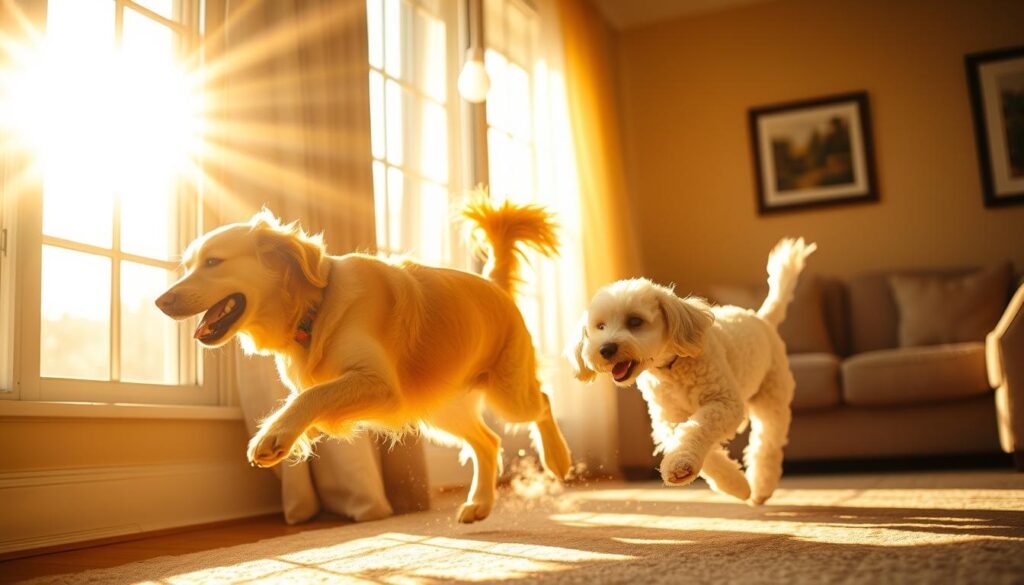The Importance of Natural Light for Indoor Pet Health

Just like humans, your dog needs exposure to natural light to stay healthy. The sun's rays have a profound impact on the well-being of pets, influencing their physical and psychological health.
Naturally, dogs seek warmth and comfort by lying in the sun, satisfying their instincts. However, modern indoor living can disrupt this natural relationship, leading to various health issues due to insufficient light exposure.
Understanding your pet's relationship with natural light can significantly improve their quality of life. This article will explore the benefits of natural light for indoor pets, including physical health, psychological wellbeing, and behavioral improvements, and provide practical advice to optimize their exposure.
How Sunlight for Pets Affects Their Biological Rhythms
Your dog's exposure to natural light has a profound effect on their circadian rhythm, influencing various bodily functions. The circadian rhythm is a complex system that controls the day/night cycle in animals, and it's essential for maintaining overall health and wellbeing.
Understanding Circadian Rhythms in Animals
Circadian rhythms function in animals by regulating the internal clock, which dictates various physiological processes. In dogs, this internal clock is influenced by exposure to light and darkness, which in turn affects their behavior, hormone production, and other bodily functions. A healthy circadian rhythm is critical for good health, controlling patterns of brainwave activity, hormone production, cell regeneration, and many other biological/biochemical activities over the day/night cycle.
The Connection Between Sunlight and Melatonin Production
Sunlight hitting the back of the eye (the retina) and skin in the morning has a significant impact on your dog's circadian rhythm. Light-sensitive cells in the eye act through the hypothalamus (in the brain) to regulate the circadian rhythm through complex hormonal pathways. Melatonin is the most important hormone for regulating a healthy circadian rhythm. Melatonin levels increase in the late afternoon and evening from the influence of red light and darkness, calming your dog. In the morning, exposure to natural light suppresses melatonin production, helping your dog wake up and become active.
The relationship between sunlight and melatonin production is crucial for maintaining a healthy circadian rhythm in dogs. As the day progresses, the changing light patterns trigger various hormonal responses, preparing your dog for rest and sleep or activity and wakefulness.
- Natural light exposure helps regulate the circadian rhythm in pets.
- Morning sunlight suppresses melatonin production, promoting wakefulness.
- Evening light patterns trigger melatonin production, preparing pets for rest.
The Science Behind Natural Light and Pet Health
The relationship between natural light and pet health is complex and multifaceted, involving various biological and physiological processes. As a pet owner, understanding this connection can help you create a healthier environment for your pets. Natural light exposure is not just beneficial for humans; it plays a crucial role in the wellbeing of dogs and other animals as well.
Different Light Spectrums Throughout the Day
The sun emits different light spectrums throughout the day, affecting your pet's biological rhythms. In the morning, the light is rich in blue, green, and red spectrums but lacks UV light, kick-starting your dog's metabolism and reducing melatonin levels. At midday, the full spectrum, including UVB, provides maximum biological benefits. As the day progresses into afternoon and evening, the spectrum shifts to red and infrared (IR), triggering melatonin production to prepare your pet for rest.

How Pets Process Light Through Their Eyes and Skin
Pets process light through both their eyes and skin. All mammals, including dogs, are highly photosensitive, responding not just to the presence or absence of light but also to its color and spectrum. The light that reaches their skin and eyes influences their circadian rhythms, hormone production, and overall health. Understanding how your pet processes light can help you manage their exposure to sunlight effectively.
Physical Benefits of Natural Sunlight Exposure
Exposure to natural sunlight has numerous physical benefits for your pets, enhancing their overall health and well-being. As we explore these benefits, it's clear that sunlight plays a crucial role in maintaining your pet's health.
Vitamin D Production and Absorption
When your dog is exposed to sunlight, their skin produces vitamin D, a crucial nutrient for calcium absorption and bone health. This process is essential for maintaining strong bones and teeth in pets.
Joint and Muscle Health Improvements
Sunlight can help alleviate joint stiffness and muscle soreness, particularly in older dogs. The warmth from the sun relaxes muscles and improves flexibility, making it a simple yet effective way to enhance your pet's mobility.
Coat and Skin Health Benefits
Moderate sun exposure can improve your pet's coat quality and skin health. Sunlight's natural antibacterial properties help control harmful bacteria on the skin, potentially preventing certain skin conditions. This can lead to a shinier coat and overall better skin health for your dog.
Psychological and Behavioral Benefits of Sunlight
Sunlight is not just beneficial for your dog's physical health; it also has significant mental health benefits. Exposure to natural light triggers the release of serotonin, often referred to as the "feel-good" hormone, which can help improve your dog's mood and reduce stress.
Mood Enhancement and Stress Reduction
Regular access to sunlight can significantly reduce anxiety and stress-related behaviors in indoor pets. Natural light exposure has been shown to stimulate mental activity and provide environmental enrichment, leading to a more balanced and content pet. As a result, your dog is likely to exhibit fewer behavioral issues and be more active and engaged in daily activities.
Impact on Sleep Quality and Energy Levels
Just like humans, dogs have an internal clock that is regulated by exposure to natural sunlight. This helps promote healthier sleep patterns, contributing to improved sleep quality. A well-rested dog is often happier and more active, with regular sunbathing contributing to enhanced energy levels throughout the day
Potential Risks of Sun Exposure for Indoor Pets
While sunlight is essential for your pet's health, excessive sun exposure can pose significant risks. As a responsible pet owner, it's crucial to understand these risks to ensure your pet enjoys the benefits of sunlight while minimizing potential harm.
Overheating and Dehydration Concerns
Dogs, unlike humans, don't sweat to cool down; they rely on panting. Prolonged sunbathing in hot weather can lead to heatstroke, a serious condition requiring immediate veterinary attention. To prevent this, ensure your dog has access to shaded areas and plenty of water during outdoor activities.
Sunburn Risks for Different Pet Types
Yes, dogs can get sunburned, especially those with light-colored or thin coats. Their noses, ears, and other exposed areas are most at risk. Pet owners should be cautious and consider protective measures such as pet-safe sunscreen or clothing to protect these vulnerable areas.
Long-term Exposure and Skin Cancer Risk
Prolonged and intense sun exposure can increase the risk of skin cancer in dogs, particularly those with light-colored coats or those spending significant time outdoors. Being mindful of the time your pet spends in the sun, especially during peak hours, can help mitigate this risk.
To balance the benefits of natural light with the potential risks, consider the time of day and your pet's individual tolerance. For instance, short walks during the early morning or late afternoon can be a safer way to provide your pet with necessary sunlight without the risks associated with peak sun hours.
Creating a Pet-Friendly Indoor Environment with Natural Light
Ensuring your pet has access to natural light is crucial for creating a pet-friendly indoor environment. Natural light exposure can significantly impact your pet's health and wellbeing.
Optimal Window Placement and Access
To maximize natural light, arrange your furniture to allow your pet easy access to windows. Create comfortable sunbathing spots near windowsills where your pet can safely enjoy the sunlight. Consider using window treatments that allow sunlight to filter through while protecting your pet from intense sun rays.
Safe Outdoor Spaces for Controlled Sun Exposure
Designing safe outdoor spaces like enclosed patios or catios can provide your pet with controlled sun exposure. These areas allow your pet to enjoy the benefits of natural sunlight while minimizing risks such as overheating or sunburn.
Balancing Natural Light Throughout Your Home
To create a balanced indoor environment, ensure there's a mix of sunny and shaded areas throughout your home. This allows your pet to choose where they want to be based on their comfort level. You can also supplement natural light with appropriate lighting solutions during periods of low sunlight.
By implementing these strategies, you can create a pet-friendly indoor environment that harnesses the benefits of natural light for your pet's health and wellbeing.
Conclusion: Bringing the Benefits of Nature Indoors for Your Pet's Wellbeing
The benefits of natural light for indoor pets are multifaceted, ranging from physical health improvements to psychological wellbeing. Ensuring your dog gets adequate sunlight is essential for their overall health, as it impacts their vitamin D production, melatonin regulation, and overall energy levels.
To create a pet-friendly indoor environment, it's crucial to strike a balance between providing adequate sunlight exposure and taking necessary safety precautions. Observe your pet's natural preferences for light and dark spaces, and start with small changes to improve their access to natural light. This might involve rearranging your home to maximize sunlight or creating safe outdoor spaces for controlled sun exposure.
By making these thoughtful adjustments to your daily routines, you can strengthen the bond with your pet and enhance their quality of life. So, take a moment to appreciate the simple joys of watching your dog luxuriate in the sun, and enjoy the harmony of nature and companionship that comes with it.

Leave a Reply